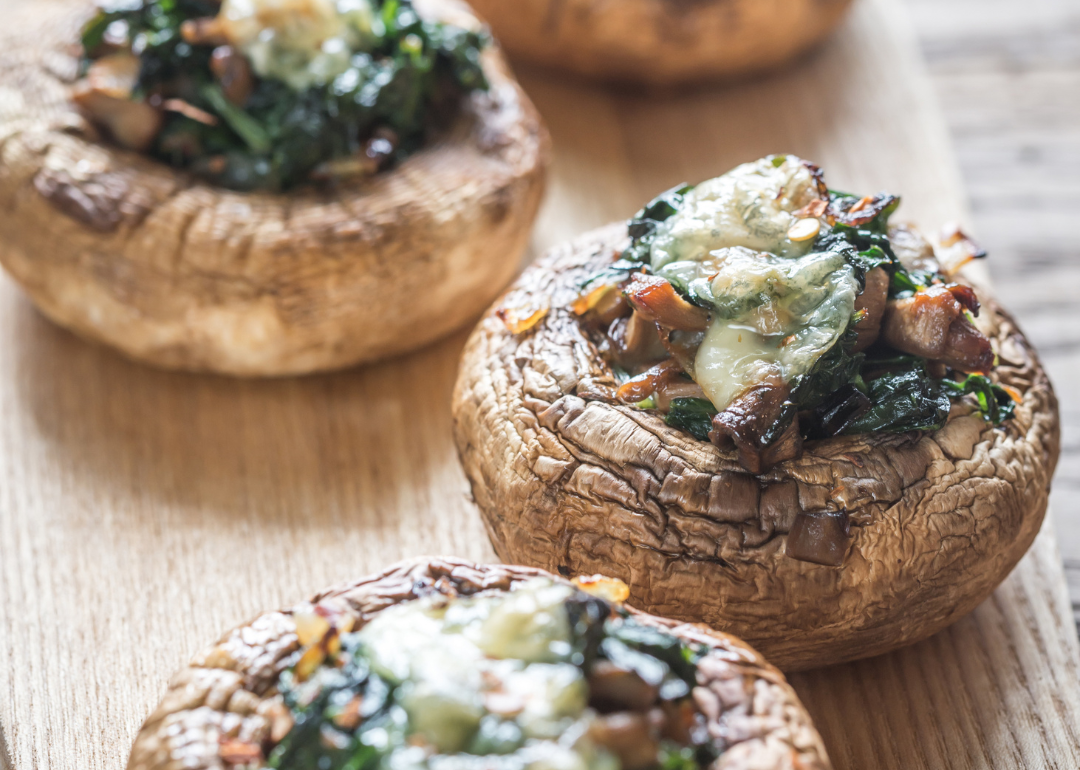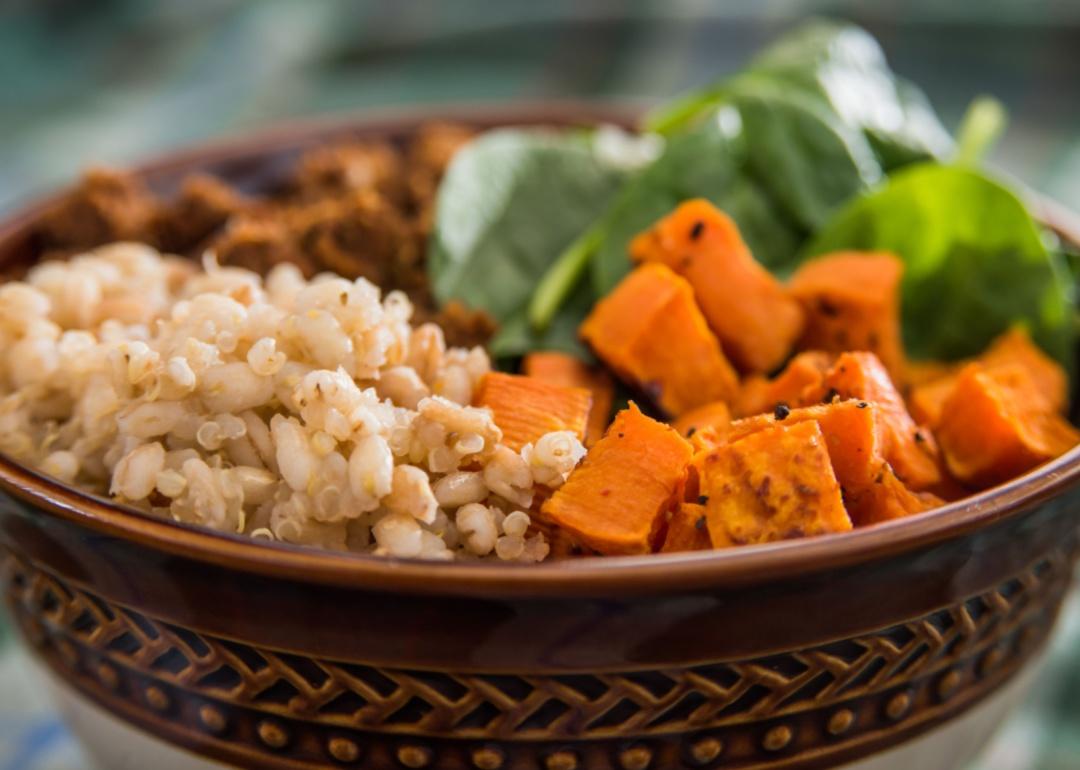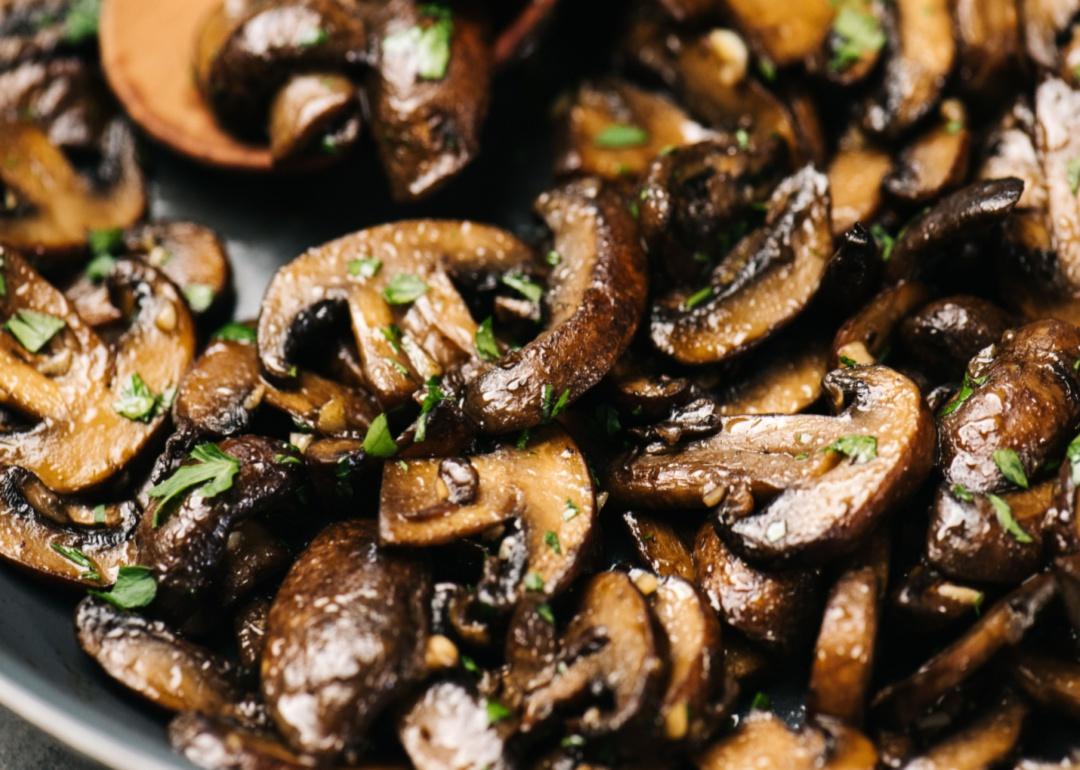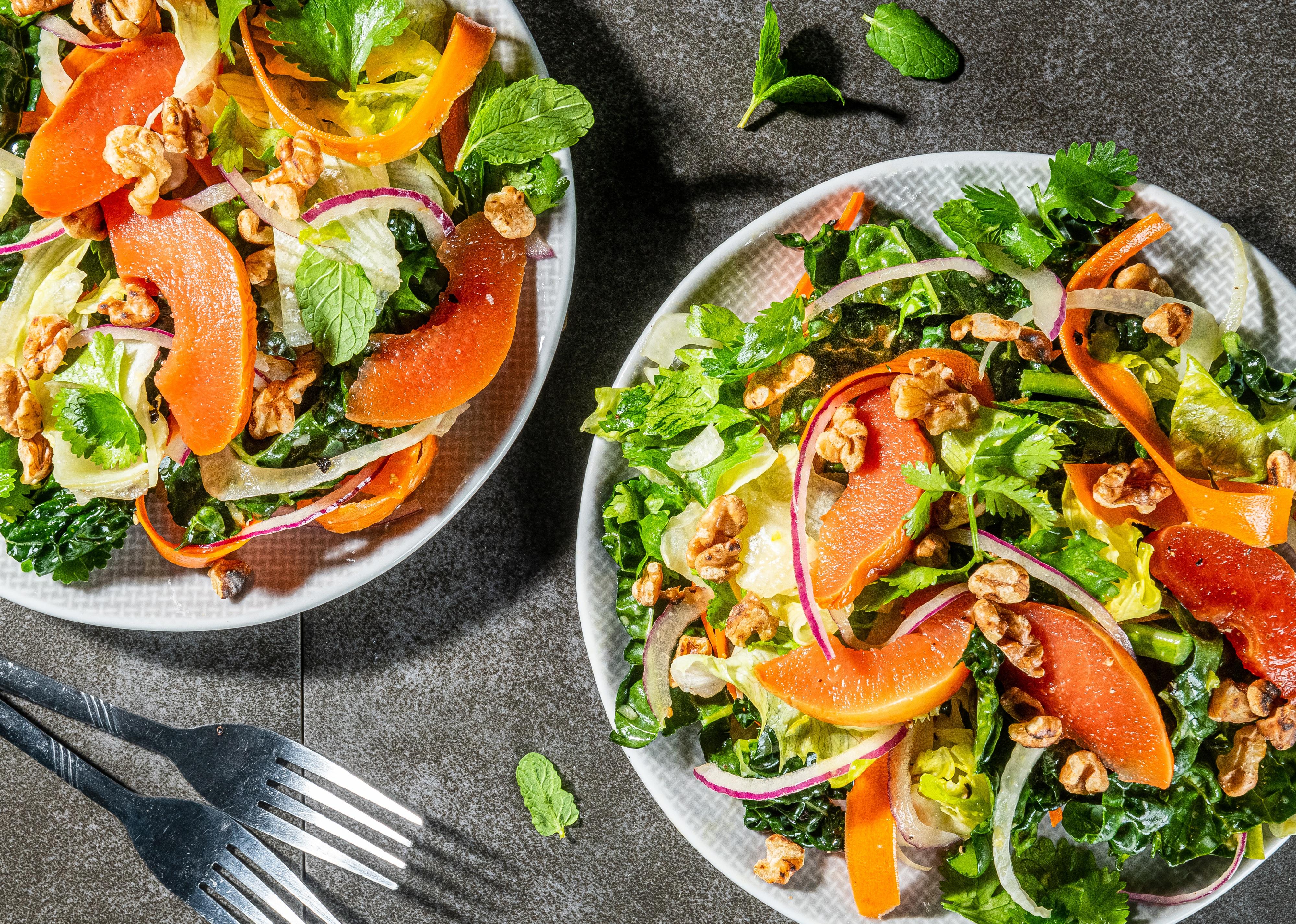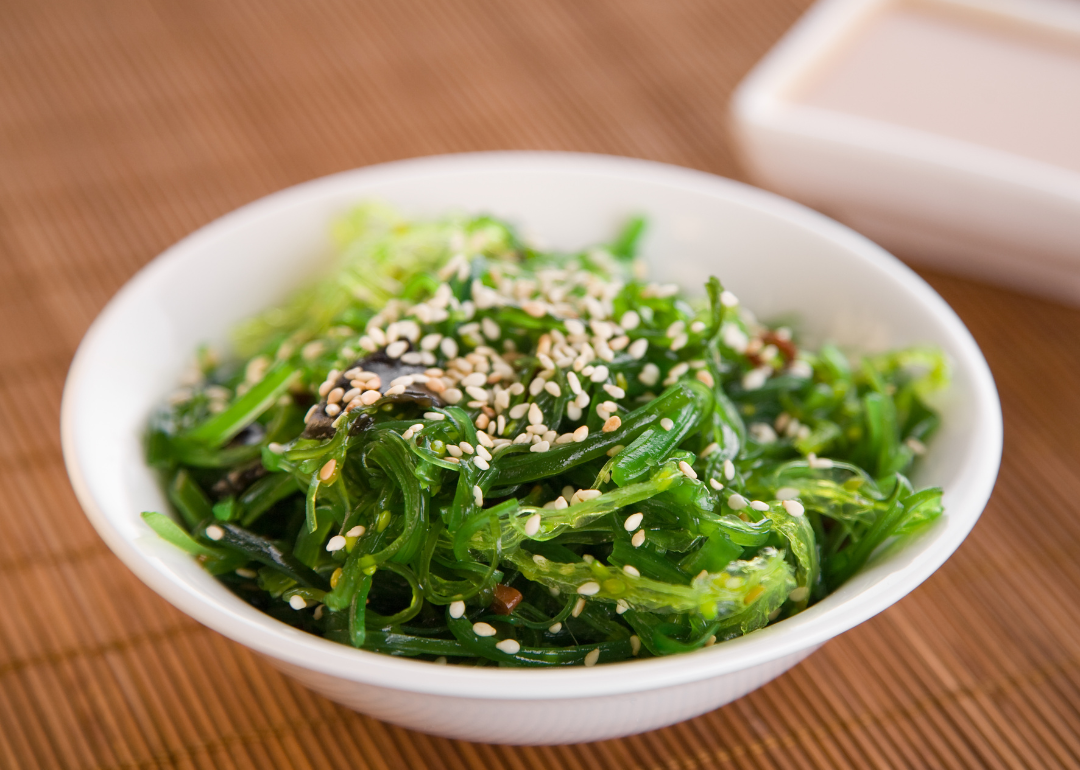7 essential nutrients your plant-based diet may be lacking (and how to get them)
Ole Spata/picture alliance // Getty Images
7 essential nutrients your plant-based diet may be lacking (and how to get them)
A woman shopping for vegetables with a canvas bag that says I love vegan on it.
The prevalence of veganism in the United States increased 30-fold between 2004 and 2019. In addition to being less costly overall than diets that include conventional meat products, plant-based diets are associated with myriad health benefits, including a reduced risk of developing certain cancers, lower BMI, lower cholesterol, and a lowered risk of heart disease.
Food manufacturers have taken note: As of 2022, the plant-based food market has grown to $8 billion in sales, according to data from the Good Food Institute. However, many plant-based meal options are highly processed and can be deficient nutritionally compared with animal-based foods. Many essential nutrients for critical bodily functions and structures remain largely or exclusively found in animal-based foods, from iron to vitamin B12.
There is a link between nutritional deficiencies and many health effects, many of which may become permanent if left untreated. Followers of plant-based diets—as well as anyone interested in their overall health and well-being—may be wise to ensure they meet their daily nutritional needs.
Thistle identified essential nutrients often deficient in plant-based diets and how to supplement them with nonanimal-based sources using a 2021 study published in Clinical Nutrition, along with other scientific sources.
![]()
Canva
Vitamin B2
Stuffed mushrooms with spinach and cheese.
Vitamin B2, or riboflavin, is an essential B vitamin that assists in breaking down and converting macronutrients into energy.
The body can only store limited amounts of the vitamin, which depletes throughout the day, so people must consume it daily. Regular and sufficient riboflavin intake helps protect the mucous membranes in the small intestine, regulate hormone production, and maintain healthy eyes, skin, and nerves.
The vitamin in plentiful amounts is in meat, fish, dairy foods, legumes, and some vegetables; however, a recent meta-analysis revealed that those practicing vegan diets consume the lowest amounts of vitamin B2 compared with nonvegan diets. Therefore, those who follow plant-based diets should consider adding riboflavin-rich foods to their meals. The plant-based foods highest in riboflavin are mushrooms, spinach, almonds, avocado, fortified tofu, bread, and cereals.
Nick Lundgren // Shutterstock
Niacin
A brown rice, quinoa, spinach and sweet potato bowl.
Niacin, known as vitamin B3, also helps convert macronutrients into stored energy. It is essential for hormone production in the adrenal glands and is known to help improve blood circulation. It also assists in regulating blood sugar levels, reducing “bad” cholesterol, and may also help increase high-density lipoproteins, or “good” cholesterol.
Niacin deficiencies are relatively uncommon in developed countries, but those suffering from alcoholism or practicing plant-based diets are at risk. The top plant-based sources of niacin include sweet potatoes, brown rice, nuts, seeds, legumes, avocados, marinara sauce, and green peas.
myboys.me // Shutterstock
Vitamin B12
A person holding a fork of Tempeh over a bowl.
Vitamin B12 is essential for forming red blood cells and DNA, maintaining nerve and brain function, and supporting cell metabolism. Because it is present almost exclusively in animal-based products, including meat, fish, and dairy, it is one of the most common micronutrient deficiencies among those following plant-based diets.
A link exists between insufficient vitamin B12 intake and various health issues, including fatigue, muscle weakness, impaired brain function, anemia, intestinal problems, and nerve damage. Long-term and untreated vitamin B12 deficiency can permanently damage the brain and central nervous system.
Some food manufacturers fortify breakfast cereals, tofu, and soymilk with vitamin B12, but it can also be found in nutritional yeast and tempeh.
Cavan-Images // Shutterstock
Vitamin D
Sautéed cremini mushrooms.
Vitamin D is a critical micronutrient for bone health, as it helps the body absorb phosphorus and calcium—the building blocks for bones. A deficiency can lead to bone-related diseases, including osteoporosis, rickets, osteomalacia, and fractures. Despite these consequences, nearly a quarter of Americans are deficient in vitamin D.
The body forms vitamin D in response to sun exposure, but most people need to consume it through their diet as well to receive a sufficient amount. While high amounts are present in beef liver and fatty fish, those following plant-based diets may supplement with other sources high in vitamin D, including mushrooms that grow in sunlight, like cremini mushrooms, as well as fortified products such as soy milk, tofu, and orange juice.
Rey Lopez for The Washington Post // Getty Images
Iron
A greens and quince salad.
Iron is a component of hemoglobin, a protein in red blood cells that distributes and carries oxygen throughout the bloodstream and body. Insufficient iron intake can thus cause fatigue, shortness of breath, exercise intolerance, and more.
Sufficient vitamin C intake is also necessary for proper iron absorption and function. Despite its critical role in the body, iron deficiency is the most common nutrient deficiency among followers of all types of diets. About 4-5 million Americans experience iron-deficiency anemia each year.
While iron is abundant in animal products, plant-based diet followers can supplement with spinach, kale, and other dark leafy greens, peas, tofu, pumpkin, nuts, and dried fruits, including raisins.
Candice Bell // Shutterstock
Calcium
Lentil soup with carrots and spinach.
Calcium is the body’s most abundant mineral and the precursor for numerous vital bodily structures and functions. In addition to building strong bones and teeth, calcium is necessary for muscle movement and nerve function.
Dairy products are the most common source of calcium for those in the United States. Still, vegans and other plant-based diet followers have plenty of other high-calcium food options to suit their preferences. The most calcium-rich foods not sourced from animals include seeds, beans, lentils, almonds, rhubarb, amaranth, soy, figs, and dark leafy greens.
Canva
Iodine
A bowl of seaweed salad.
Most commonly found in seafood, iodine is a trace mineral that enables the thyroid to produce hormones, including those that support metabolic processes. Insufficient iodine intake is linked with conditions related to thyroid dysfunction, including goiter. Because the body cannot produce iodine alone, deficiencies are common among all types of diets. However, they are more prevalent among those who cannot or do not eat high-iodine sources like seafood, milk, and eggs.
The easiest and most common way to supplement insufficient iodine intake is to use iodized salt to season meals, but you can also find it in seaweed, prunes, and lima beans.
Additional research by Emilia Ruzicka. Story editing by Brian Budzynski. Copy editing by Kristen Wegrzyn. Photo selection by Lacy Kerrick.
This story originally appeared on Thistle and was produced and
distributed in partnership with Stacker Studio.

